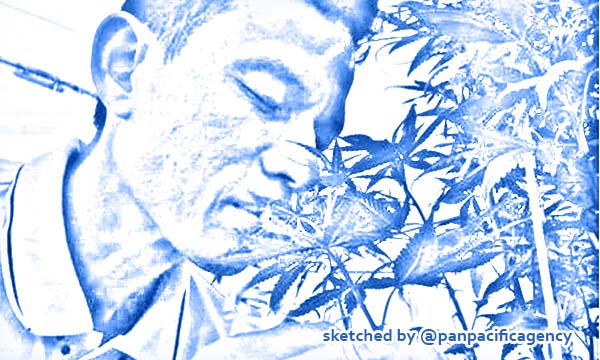Singapore expresses disappointment at decision to reclassify cannabis

A Thai man sniffs marijuana plants at the Cannabis Expo in Buriram province, Thailand, April 19, 2019. Photo: Facebook. Sketched by the Pan Pacific Agency.
SINGAPORE, Dec 3, 2020, ST. The Singapore Government has registered its disappointment at a United Nation commission’s reclassification of cannabis as a less dangerous drug, saying this could fuel the wrong perception that it is less harmful than before, The Straits Times reported.
The statement issued by the Ministry of Home Affairs (MHA) on Thursday (Dec 3) came after the United Nations Commission on Narcotic Drugs voted on Wednesday to remove cannabis for medicinal purposes from a category of the world’s most dangerous drugs.
The 53 member states of the commission had voted to accept one of six recommendations on cannabis and cannabis-related substance put forward by the World Health Organisation Expert Committee on Drug Dependence.
The other five recommendations were rejected.
The recommendation, which required a simple majority to pass, was voted for by 27 member states, with 25 voting against and one abstaining.
In its statement, the Home Affairs ministry said: “Singapore is disappointed with this outcome. There is no strong evidence to support the recommendations, including Recommendation 5.1.”
The acceptance of the recommendation means that cannabis and cannabis resin would no longer be listed with the most dangerous drugs, such as heroin, in Schedule IV under the Single Convention on Narcotic Drugs of 1961, although international control measures for them remain unchanged.
Schedule IV lists the most dangerous substances that are highly addictive, liable to abuse and rarely used in medical practice. The Convention allows countries to impose conditions on such drugs, except for the amounts needed for medical and scientific research.
The MHA said the acceptance of Recommendation 5.1 could send a wrong signal that the UN commission has softened its stance against cannabis and fuel public misperception, especially among young people – that cannabis is no longer considered to be as harmful as before, despite strong evidence showing otherwise.
The decision will not impact Singapore’s zero-tolerance stance against drugs, including against cannabis and cannabis-related substances, added the ministry.
The international drug control conventions allow countries the flexibility to adopt national measures that are stricter than required by the conventions, it noted.
Singapore is not a voting member of the commission – the main drug policymaking body of the UN – but has been involved in discussions it held.
Delivering a statement at the 63rd session of the UN commission, Singapore’s Permanent Representative to the UN in Geneva, Ambassador Umej Bhatia, reiterated the Republic’s stance on this issue, joining 28 other countries aligned against the recommendations.
These countries – including China, Egypt, Indonesia, Russia, Sri Lanka, Sudan and Turkey – agreed that acceptance of Recommendation 5.1 should not be viewed as an endorsement of recreational cannabis nor lead to further liberalisation of controls over cannabis.
Mr Bhatia said that the voting outcomes had demonstrated clearly that there was no international consensus on the WHO Expert Committee’s recommendations to the UN commission.
“Clearly, there is a lack of adequate and robust evidence to substantiate these recommendations, particularly on the safety and efficacy of cannabis and its related substances for medical purposes.
“In contrast, there is well-founded and incontrovertible research that establishes several short-term and long-term adverse effects associated with cannabis use,” he said, adding that these include impairments to respiratory and cognitive functions.
The adoption of Recommendation 5.1 fundamentally goes against principles of consensus and evidence-based drug policymaking, and threatens to undermine the duty to protect public health and welfare, he told the commission in a statement led by Russia.
“We will continue to keep cannabis and cannabis-related substances under robust control in Singapore, to ensure that Singaporeans are kept safe from their scourge.”
The WHO Expert Committee on Drug Dependence had made the six recommendations in January last year. It consists of an independent group of experts in the field of drugs and medicine.
The committee is convened by the WHO about once a year to review the public health impact of psychoactive substances and make recommendations to the international community.
In its statement, the MHA said the Singapore Government does not support the recommendations.
It said that contrary to the WHO expert committee’s views, there are no compelling justifications that the proposed rescheduling is required to reduce barriers to access cannabis and its related substances for medical and scientific purposes.
The current international drug control system already provides adequate access to such stances for these purposes, the MHA added.
Not only would some of the recommendations, if accepted, cause gaps in the implementation of control measures and undermine the integrity of the international drug control regime, but it could also create the misperception that cannabis is no longer considered harmful by the international authorities, the MHA said.
It reiterated that Singapore would continue to enforce strict laws against the trafficking, possession, consumption and import and export of illicit drugs, including cannabis, to protect the health and welfare of its people.
According to the World Drug Report 2020, cannabis is the most abused drug in the world, with 192 million users globally.